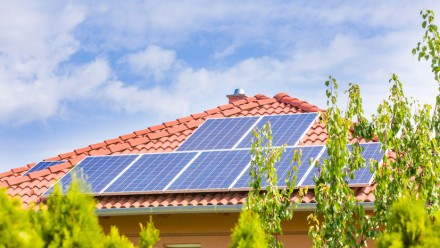Energy Conversations: Maximising Consumer Ability to Manage Electricity Demand
Time-varying electricity rates are an increasingly widespread form of determining the price that consumers pay for electricity, based upon both how much electricity they are using, and when they are using it.
How do these rates impact electricity use for energy efficient versus energy inefficient homes?
Join us to hear Dr Lee White present her team’s findings on this question, and to hear a panel discussion on the topics of energy efficient homes and how best to maximise consumer ability to manage electricity demand.
This event provides a forum for conversations between different parts of the local energy sector about emerging research and technology.
The event will be recorded, with the recording made publicly available on the Institute for Climate, Energy & Disaster Solutions YouTube channel.
This research was funded by the Icon Water and ActewAGL Perpetual Endowment Fund.
Main presentation
Dr Lee White: Research Fellow with the Zero-Carbon Energy for the Asia-Pacific Grand Challenge, at the School of Regulation and Global Governance
Presentation title: Maximising Consumer Ability to Manage Electricity Demand
Abstract: Time-varying electricity rates are a form of demand management that may become widespread as part of a toolkit to integrate renewable generation. There is a need to understand the extent to which low energy efficiency homes limit the ability of households to manage costs on time-varying electricity rates, and whether these households are less able to control timing of electricity use than those with more energy efficient homes. We examine electricity bill and consumption outcomes for low-energy efficiency households on time-varying versus flat rates, and compare it to the experience of households in high energy efficiency homes across rates. Using a sample of 1,221 households in the Australian Capital Territory (ACT) with panel data for up to five years, we use two-way fixed effects to estimate the effect of switching to a time-of-use (TOU) rate on quarterly household bills and quarterly electricity consumption, allowing for heterogeneous effects as a function of building Energy Efficiency Rating (EER) and performing robustness checks examining time trends with leads and lags. We find that high-EER households increase electricity use when on TOU instead of flat rates. Low-EER households see lower electricity use when on TOU rates, but this appears to be part of a pre-existing trend of reducing consumption over time. While less robust, we also find that high-EER households see higher bills when on TOU rates, while low-EER households without gas see lower bills on TOU rates. These findings indicate that EER is associated with different experiences of electricity bills and consumption across rate types, however, low-EER households do not appear to be financially disadvantaged in either an absolute or a relative sense when on TOU instead of flat rates. Findings further suggest that households are generally not well able to optimise their load profiles to minimise bills when on time-varying rates, with the possible exception of low-EER households without gas. We recommend that more frequent and detailed information provision to households could support better financial outcomes for all households.
Opening statements
- Prof Frank Jotzo: Head of Energy, ANU Institute for Climate, Energy & Disaster Solutions
- Jessica Lees: Head, Employment Experience Solutions, ActewAGL
Panellists
- Dr Emma Aisbett: Fellow, School of Regulation and Global Governance and Associate Director, Research, Zero-Carbon Energy for the Asia-Pacific Grand Challenge
- Daria Teodorowych: Project and Sales Manager, LAROS Group
- Gene McGlynn: Executive Group Manager, Climate Change and Energy, ACT Government
- Lahiru Hapuarachchi: Lead Product and Innovation Engineer at ActewAGL
- Michael Ambrose: Senior Experimental Scientist: Energy, CSIRO
- Dr Ralf Steinhauser: Senior Research Fellow, College of Arts and Social Sciences
Moderator
Steve Blume: Director, Australian Institute of Energy; President, Smart Energy Council; Treasurer, New Zealand & Pacific Solar & Storage Council; Director, Asia Pacific PV Industry Association
This event is hosted by the Australian Institute of Energy and the ANU Institute for Climate, Energy & Disaster Solutions.

Event registration privacy notice:
The information on this form is being collected by the Institute for Climate, Energy & Disaster Solutions (ICEDS), Australian National University (ANU). This event is co-hosted by the Australian Institute of Energy, and a copy of your registration details may be provided to them for event evaluation purposes.
The information is being collected, with your consent, in order to complete your registration for the Energy Conversations: Maximising Consumer Ability to Manage Electricity Demand event, to subscribe you to the ANU ICEDS mailing list and to keep you informed of other relevant ICEDS events and opportunities. You can unsubscribe at any time by clicking on the unsubscribe button at the bottom of correspondence.
This information will also be used by authorised staff within the Institute for Climate, Energy & Disaster Solutions to review the demographics of our event audience, and to see whether we are reaching our target audiences.
The information will be used by authorised staff for the purpose for which it was collected, to analyse and any other purpose which you have expressly consented to.
You can withdraw your registration any time by contacting iceds@anu.edu.au
The ANU is committed to protecting personal information provided by you in accordance with the Privacy Act 1988 (Cth) and the information will be protected against unauthorised access and use.
All information collected by the University is governed by the ANU Privacy Policy.
For further information about how the University deals with personal information, please refer to the ANU Privacy Policy or contact the ANU Privacy Officer at privacy@anu.edu.au.
You may access or request correction of any personal information you have provided to ANU by contacting privacy@anu.edu.au









